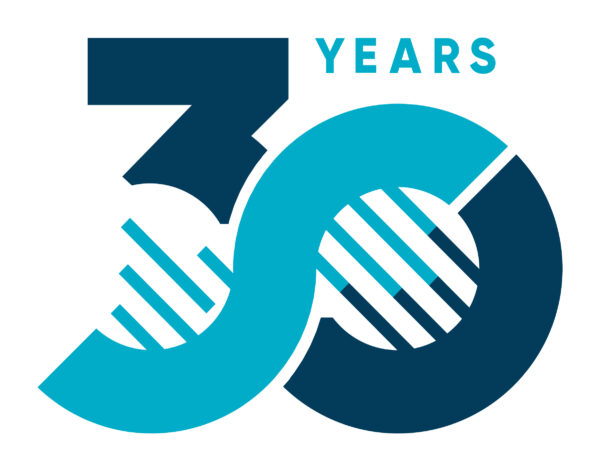Our History: A Generation of Progress
In the 30 years since The Hope Foundation for Cancer Research was established, the cancer death rate in the United States has dropped 30 percent – which translates into more than 3 million deaths avoided. Much of this success was driven by research.
A related narrative telling of our history can be found here.
1993
- First board of directors elected in Denver, Colorado
- IRS receives request for nonprofit status
- Office opened in San Antonio, Texas
- SWOG launches the Prostate Cancer Prevention Trial
1994
- First pharma grants are received from Bristol Myers Squibb, Immunex, and Rhône-Poulenc.
- The FDA establishes the Office of Women’s Health to promote participation in clinical trials.
1995
- SWOG launches its first website.
- The tumor suppressor gene BRCA2 is cloned; The previous year, BRCA1 was cloned.
1996
- The FDA approves anastrozole, the first aromatase inhibitor approved for cancer therapy.
1997
- The FDA approves rituximab, the first monoclonal antibody approved for cancer therapy.
- The National Cancer Institute creates the Cancer Genome Anatomy Project, championed by Vice President Al Gore, an online database on normal, pre-cancerous and cancerous genomes aimed at characterizing cancer on a molecular level.
1998
- Brian D. Chavez hired as executive vice president and chief executive officer.
- The Southwest Oncology Group Foundation updates its name to The Hope Foundation.
- Results of the NCI-sponsored Breast Cancer Prevention Trial show that the anti-estrogen drug tamoxifen can reduce the incidence of breast cancer among women who are at increased risk of the disease by about 50 percent.
1999
- Ortho Biotech becomes original sponsor of the Young Investigator Training Course.
2000
-
- First Young Investigator Training Course held.
Dana Sparks is the Director of Operations & Protocols for SWOG Cancer Research Network. Here she discusses the SWOG Early Stage Investigator Training Course and how The Hope Foundation’s support of this program – and others – has helped them thrive:
2001
- SWOG launches Clinical Trials Training Course for clinical research associates.
- Results of a clinical trial show that the drug imatinib mesylate is effective against chronic myelogenous leukemia, changing the usually fatal disease into a manageable condition.
2002
- Andy Jang, MD, an early graduate of the Young Investigator Training Course, develops S0211 which activates in April.
2003
- Hope funds a research summit in Japan, its first international effort, and a conference in Hawaii with Japanese researchers. A young investigator named Charles Blanke was in attendance.
- Results of SWOG’s Prostate Cancer Prevention Trial show that the drug finasteride lowers a man’s risk of prostate cancer by about 25 percent.
2004
- Syma Iqbal, MD, who completed the Young Investigator Training Course in 2000, chairs S0413, which finds that among patients with advanced or metastatic gastric cancer, those with higher HER2 levels have increased overall survival when treated with lapatinib, offering solid evidence that targeted therapy works in a tumor.
2005
- Laurence Baker, DO, becomes SWOG group chair.
- Hope offices move to Ann Arbor, Michigan.
- Group statistician appointed as a permanent member of the Hope board.
- SWOG establishes its biospecimen bank.
2006
- SWOG begins enrolling more than 5,000 patients a year.
- FDA approves the human papillomavirus (HPV) vaccine Gardasil, which protects against infection by the two HPV types that cause approximately 70 percent of cervical cancer cases.
2007
- Charles A. Coltman retires after 44 years with SWOG.
- The Charles A. Coltman Jr. Fellowship is established.
- Jo Horn elected Hope executive director.
2008
- Deborah Bradley, MD, awarded the first Coltman Fellowship.
- Hope and SWOG financial staff move offices
- Assistant to the Foundation Director is hired
2009
- Approval of the transfer of the subcontract for SWOG’s Operations Office to Hope.
- Patient advocacy gains momentum in SWOG. Hear from patient advocate committee leaders Rick Bangs and Hildy Dillon regarding their experience supporting SWOG research:
2010
- Hope governance committee created
- Hope legally establishes SWOG-CTI (Later, SWOG Clinical Trials Partnerships) LLC
- SWOG drops “Southwest” from its name
- Initial results of the NCI-sponsored Lung Cancer Screening Trial (NLST) show that screening with low-dose helical computerized tomography (CT) reduced lung cancer deaths by about 20% in a large group of current and former heavy smokers.
- FDA approves the first human cancer treatment vaccine for metastatic prostate cancer that no longer responds to hormonal therapy.
2011
- Hope earns a 4-star Charity Navigator rating for the first time
- Hope applies to be an ACCME-accredited continuing medical education (CME) provider
- Impact Award program launches (under original name: Development Award program)
- FDA approves the use of ipilimumab, a monoclonal antibody, for the treatment of inoperable or metastatic melanoma. Ipilimumab stimulates the immune system to attack cancer cells by removing a “brake” that normally controls the intensity of immune responses.
2012
- Charles Blanke, MD, is elected as new SWOG Chair
- Increased transparency and professionalism to Board – proposed amendments to bylaws: Establish emeritus, non-voting board member, include new SWOG chair as board member, include finance and governance committees, board evaluation of executive director, term limits for board members
2013
- Omar Aljitawi, MD, of the University of Kansas Cancer Center receives an Impact Award to pilot the use of hyperbaric oxygen to understand how increased air pressure and oxygen intake can help speed engraftment after transplantation, thus reducing the duration of neutropenia and improving overall patient health. He presents this research two years later at the spring SWOG translational medicine plenary session (“Plenary I”).
2014
- First Integrated Translational Science Center (ITSC) grants awarded, ushering in exciting collaboration between SWOG clinicians and partners at CSHL and JAX
- First SWOG Early Exploration and Development (SEED) Fund grants awarded ($50K grants for preliminary research projects)
- First SWOG Trial Support (STrS) grants awarded, providing supplemental funds for critical trial needs
- FDA approves pembrolizumab for the treatment of advanced melanoma. This monoclonal antibody blocks the activity of a protein called PD1 on immune cells, which increases the strength of immune responses against cancer.
2015
- First VA Integration Awards granted, marking a major commitment to enroll military veterans in cancer clinical trials
- First Secondary Data Analyses conducted through special program leveraging SWOG trial data
- Dr. Blanke climbs Mt. Kilimanjaro; aims to mobilize support for the NCTN; reaches summit February 2015; campaign raises $110,000
- NCI and the ECOG-ACRIN launch the NCI-MATCH clinical trial to test more than 20 drugs and drug combinations based on molecular analysis of tumors in people with cancer.
2016
- Hope opens call for “Great Ideas” funding proposals
The Advanced Practice Provider Initiative began as a funding request to Hope’s annual call for new proposals. Hear Jamie Myers, PhD, RN and Christa Braun-Inglis, DNP, APRN talk about the program:
- Hope debuts the virtual grant writing workshop
- Hope helps SWOG celebrate 60 years by partnering with StoryCorps to share the experiences of patients, advocates, and investigators across the group
- Vice President Joe Biden launches the Cancer Moonshot to accelerate progress in cancer research and cancer care
2017
- SWOG issues its first annual Impact Report
- NCI and the Children’s Oncology Group launch Pediatric MATCH, an effort to extend molecular analysis and targeted treatment to children and adolescents with cancer.
- FDA approves two chimeric antigen receptor (CAR) T-cell therapies, which are personalized for each patient, for acute lymphoblastic leukemia and large B-cell lymphomas
- FDA clears two products to test tumors for genetic changes that may make the tumors susceptible to treatment with FDA-approved molecularly targeted drugs.
2018
- Dr. Charles Coltman, Jr. passes away
- SWOG’s first disease monitoring study is launched, Trial S1703, by Dr. Melissa Accordino (former Coltman Fellow)
- The palliative and end of life care committee is established with support from Hope; it is the first of its kind in the NCI’s National Clinical Trials Network
- Results from the NCI-sponsored Trial Assigning IndividuaLized Options for Treatment (Rx), or TAILORx, clinical trial show that most women with early-stage breast cancer do not benefit from having chemotherapy after surgery.
- Research published by Dr. Joe Unger, SWOG biostatistician and health services researcher, showed that the differences in survival rates between rural and urban patients is significantly reduced when enrolled in a cancer clinical trial. This research received national media coverage.
- SWOG stats and data management center earned a stellar NCTN grant renewal score of 12 – the best score ever earned by any stats or ops group in our network
- Hope updates its name and brand: The Hope Foundation for Cancer Research
2019
- With Hope support, SWOG launches the community advocate program
- The Hope-supported SWOG Latin America Initiative marks its 10th anniversary. Listen to Dr. John Crowley talk about the history of SWOG’s international collaborations:
- Career Engagement Awards (CEA) launch, to support mid-career researchers through salary support for SWOG research efforts
- The Hope Foundation pledges a multi-year $1 million grant to support the SWOG Statistics Center based at Fred Hutch
2020
- Hope announces the John Crowley Award, encouraging statistical excellence in clinical trials
- A consortium of international researchers analyzes more than 2,600 whole genomes from 38 types of cancer and matching normal tissues to identify common patterns of molecular changes, a project known as the Pan-Cancer Analysis of Whole Genomes study.
2021
- Hope partners with pharma, especially with support from Genentech, to launch NCORP Pilot Grant program to further DEI within SWOG’s network
- Patricia Robinson, MD receives a DEI Career Development Award, Hope’s first career development award with a focus on enhancing diversity, equity, and inclusion in clinical trials.
- The NCI celebrates the 50th anniversary of the National Cancer Act of 1971.
2022
- Dr. Don Dizon elected first vice chair for diversity, equity, inclusion, and professional integrity
- Patient advocate team expands to 27 members
- South Texas Veterans Health Care System receives the first VA Storefront Support Program
- Young Investigator Training Course becomes Early Stage Investigator Training Course
- President Joe Biden reignites the Cancer Moonshot, with a goal of reducing the death rate by at least 50 percent in the next 25 years.


